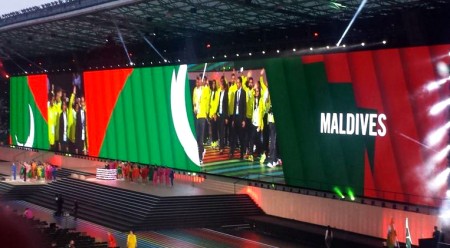Foreign Minister Dunya Maumoon has slammed statements issued by the Commonwealth and Canada expressing concern over the denial of legal representation to former President Mohamed Nasheed at the first hearing of his terrorism trial yesterday.
At a press conference today, Dunya dismissed Canadian Foreign Minister Rob Nicholson’s statement as “blatantly untrue.”
Nicholson had called Nasheed’s detention and denial of constitutional rights “abhorrent.”
“[Nicholson] had described Nasheed’s arrest as unlawful or illegal. Nasheed was arrested in relation to the kidnapping or unlawful detention of the Chief Judge of Criminal Court in 2012. That act was illegal by all international laws and principles” said Dunya.
Nasheed appeared in court yesterday with his arm in a makeshift sling after police officers manhandled the former president outside the court building when he attempted to speak with journalists.
The Commonwealth meanwhile stated that Secretary-General Kamalesh Sharma was “concerned to note reports that former President Nasheed was denied the right to legal representation”.
Responding to the statements, Dunya said: “To criticise us in public statements with lies or biased with having only heard the oppositions point of view is not acceptable. The government will not accept these statements and will not pay any attention to them.”
She added that the Maldives has long been an independent and sovereign country, “and we do not want to be under any foreign influences or under a colonial power. No foreign power can tell Maldives what to do under President [Abdulla] Yameen.”
“Wronged”
Dunya said the Maldives does not have a significant relationship with Canada.
“I don’t think they know what actually is happening in here,” she suggested.
“Canada is a very influential country in the Commonwealth. Big countries do influence [the Commonwealth] and especially if they are funding and assisting the Commonwealth, then the organisation will do what they want.”
Dunya also said the Maldives would not accept the Commonwealth’s offer of expert legal assistance.
“[The Commonwealth] wants to provide us with their expertise but we simply do not want it. We have other ways, countries ready to help and even our own way of consolidating democracy here,” she said.
Questioning the value of the Maldives remaining a member state of the Commonwealth, Dunya said the organisation had “wronged” the Maldives by placing the country on a watch-list in the wake of the controversial transfer of power in February 2012.
While the Commonwealth Ministerial Action Group (CMAG) had suspended the Maldives and placed the country on its formal agenda, Dunya noted that a Commonwealth-backed Commission of National Inquiry (CoNI) later concluded that the transfer of power was constitutional.
“So we want to say to the Commonwealth, you have wronged us in the past and you are still mistreating us,” she said.
“We don’t get much aid or development from being a Commonwealth country. In 2012, Maldivians questioned the importance of us remaining in the Commonwealth. I am sure the question will arise again.”
She added that President Yameen would make a decision on whether to remain in the Commonwealth.
“Strategic misrepresentation of basic facts”
Dunya went on to say that she did not believe Maldivians could be adversely affected as a result of the government’s stand.
“Looking at the history, even if we are to face any problems [from the international community] we have to adhere to our principles, our methods and especially our independence and sovereignty,” she said.
Dunya also issued a statement today casting doubt on the Commonwealth’s assertion that it was “closely monitoring” the situation in the Maldives, noting that the Commonwealth Secretariat had not contacted the ministry over the past few days.
“On the contrary, I initiated a phone call to the Secretary General last night in which we exchanged views about issues of mutual concern in the Commonwealth and in the Maldives. I therefore regret the strategic misrepresentation of basic facts in the Secretary General’s statement,” reads Dunya’s statement.
It added that Nasheed was arrested with a court warrant and presented before a judge within 24 hours in accordance with “normal procedure,” after which the judge granted the former president the opportunity to appoint a lawyer.
However, Nasheed was brought to court more than 24 hours after the arrest for the first hearing of a trial on terrorism charges, rather than a remand hearing.
The former president appeared at the hearing without legal representation.
Citing new regulations, the Criminal Court informed Nasheed’s legal team on Monday morning (February 23) that the lawyers had to register at the court two days in advance despite being unaware of the trial until the former president’s arrest less than 24 hours ago.
Dunya, however, insisted that that police “followed the standard procedure and due process.”
“I wish to recall that the Commonwealth Secretariat had misread the situation in the Maldives once before, in 2012 and presented it to the CMAG, which took punitive measures against the country,” Dunya noted in her statement
“The Maldives, however, emerged from the situation vindicated by the CoNI Report. The government is hopeful that the Commonwealth will not repeat the same mistakes again.”
Related to this story
Former President Nasheed arrives in court with arm in makeshift sling
Nasheed denied right to appoint lawyer and appeal “arbitrary” arrest warrant, contend lawyers
Police arrest former President Mohamed Nasheed ahead of terrorism trial
